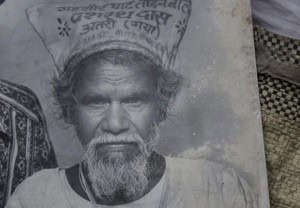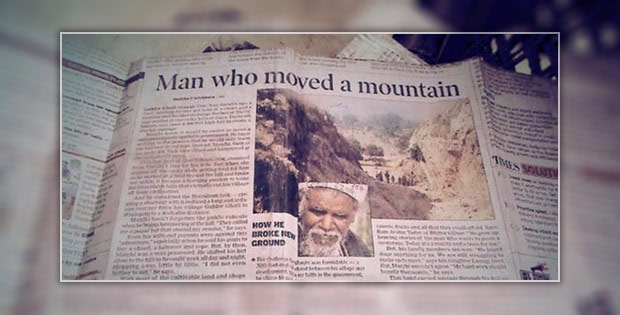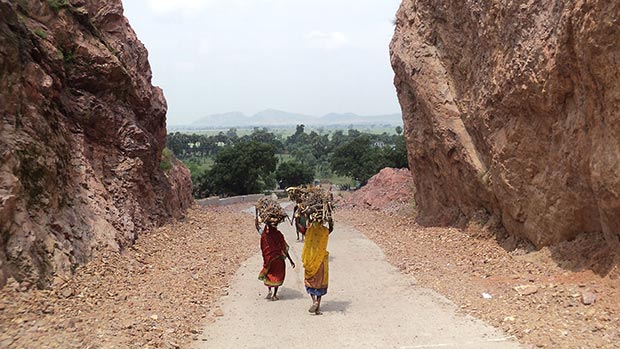Dashrath Manjhi: “the Mountain Man” who did the impossible
I started this work out of love for my wife, but continued it for my people. If I did not, no one would. Dashrath Manjhi

Dashrath Manjhi has proved that there is nothing impossible in this world. If you want to attain something you just need a handful of determination and strong belief in yourself. Manjhi serves an outstanding example of unalloyed altruism (selflessness) and devotion to one’s love, family and people.
Dashrath Manjhi has never searched for fame and acknowledgement. He just did what he did out of his best intentions to improve the life of his community. He has dedicated 22 years of his life conquering the mountain, carving out a way that would connect the isolated locality with civilization. Dashrath Manjhi succeeded to break through a mountain and build a 110-metre road for his village. Now the way to civilization has reduced from 55 km to just 15. Children has got access to school, and people – to medicine and doctors.
Dashrath Manjhi: the poorest of the poor
Dashrath Manjhi belonged to the lowest cast of the Indian society. He lived with his wife and children in the mountain enclosed settlement of Musahar. The nearest civilization was Atri block of Gaya in Bihar (a state in northern India). Manjhi and his family had no even basic modern facilities in their house: neither electricity, nor water. In the hamlet of Gehlour there was no school where local children could get education, no medical centre where villagers could get medical care in a case of illness. Tall rocky mountains separated them from the basic well-being of civilization. In 1960 Dashrath Manjhi worked for a landlord on the other side of the mountain. He tilled fields quarrying stone.
Phaguni, Dashrath’s Manjhi loyal wife
Every day at a fixed time Manjhi’s wife, Phaguni, climbed the mountain to bring some food for lunch to her husband. That day as usual Phaguni packed rotis and thin curry in a container, took a pot of water and bundled all the food in a cloth. The way to the work place of her husband would take several hours. She had to climb the mountains.
Making her way Phaguni suddenly stepped on a loose stone. She lost her balance. The water pot was shattered , lunch bundle dropped down. The woman herself slid down the mountain several feet and injured her leg. However, the loyal wife did not return home. Hours later she could reach her tired and hungry husband who was about to scold Phaguni for being late. The moment Dashrath Manjhi saw his wife limping in tears, his anger turned into a strong determination to punish the mountain and to give his people a good way to civilazation.
Manjhi the Mountain Man

Dashrath Manjhi’s decision was steadfast. To accomplish it, the man sold his goats and bought a chisel, hammer and a crowbar. Just with these three tools he went to struggle with the mountain. He could not forgive it hurting his wife and other people. Later Manjhi would say, “That mountain had shattered so many pots, claimed lives. I could not bear that it hurt my wife. If it took all my life now, I would carve us a road through the mountain.”
Slowly-slowly Manjhi was chipping the top of the mountain. It was hard work and it required a lot of effort and time. So the man left his wage job having left his family without any support. They often had just nothing to eat. Manjhi’s wife and other people did not support the determined man obsessed by his struggle with the mountain. They considered his determination as madness. No one believed he would succeed in the unthinkable enterprise he had started.
Eventually, Phaguni fell ill. The only available doctor was in Wazirganj behind the mountain. The destination was 75 kilometres. The doctor would not come himself, neither the woman could make her trip to get the medical treatment. The illness worsted the poor thing and she died. Phaguni’s death even more imflamed the man with the desire to conquer the mountain. Manjhi then worked twice hard in the memory of his beloved wife.
Manjhi Baba

In 10 years of continuous work Manjhi’s efforts became visible to villagers. They could see a cleft in a mountain. And that was a turning point in their mind. They realized what the poor ordinary man had managed to do for everyone. At times men offered him their help in shaping the mountain way.
After 22 years the determined outcast broke through the mountain and finally stepped into an open space. The carved way was 110 metres long and 18 metres wide. People from 60 villages detached from civilization used the road. Children got access to school. Now with the mountain shortcut the distance was reduced just to 3 km. In the eyes of villagers “The Mad Man” turned into the revered Baba.
Walk to New Delhi
Having broke through the mountain Dashrath Manjhi continued to enhance the way. Now he wanted the road to be tarred. He had no money but that was not a problem for him. The revered Baba walked along the railways to New Delhi collecting signatures of station masters on the petition he had written. In the petition he asked India’s government for a road, water, a hospital, and a school for his village.
In 2006 Dashrath Manjhi was honourably received by the then Bihar Chief Minister Nitish Kumar. Overwhelmed by the great deed of the common man, the minister offered Manjhi his chair. It was the gesture of ultimate respect and honour for a poor man like Manjhi.
Later the government gave Dashrath Manjhi a land plot as a reward for his efforts. The man donated it to his people. A hospital was built on it. Th Mountain Man never asked anything for himself. He just wanted to bring basic facilities to his village without which the life was almost impossible and unbearable.
I do not care for these awards, this fame, the money. All I want is a road, a school, and a hospital for our people. They toil so hard. It will help their women and children, said Manjhi.